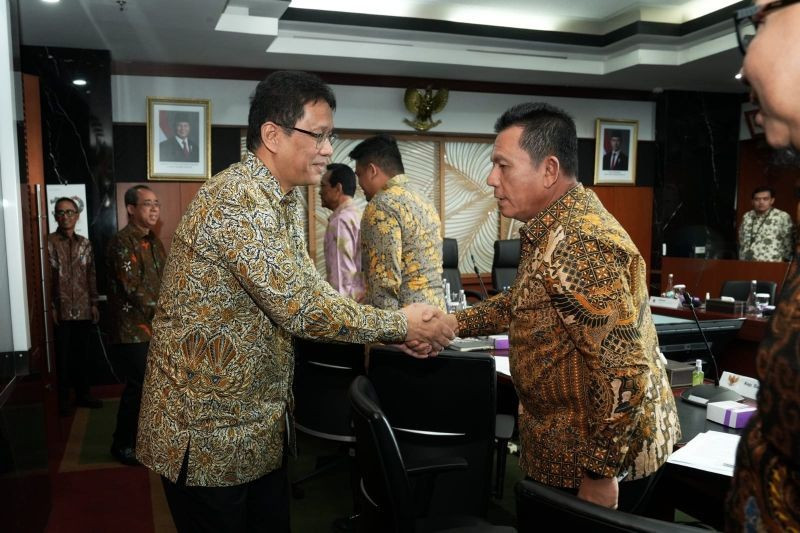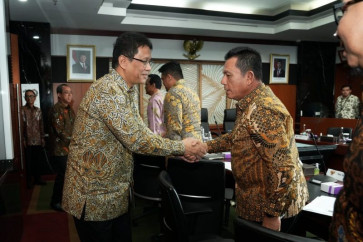Popular Reads
Top Results
Can't find what you're looking for?
View all search resultsPopular Reads
Top Results
Can't find what you're looking for?
View all search resultsAnalysis: Balancing the fiscal book, unbalancing the regions
Change text size
Gift Premium Articles
to Anyone
F
inance Minister Purbaya Yudhi Sadewa is facing growing backlash from regional governments after the central government decided to slash local transfers in the 2026 state budget to their lowest level since 2016. Purbaya insists the move is crucial to safeguard fiscal stability amid mounting budgetary pressure. Yet, his rationale raises a critical question: Can regional governments withstand the burden of this fiscal tightening?
Under the initial 2026 budget plan, transfers to the regions were set at Rp 919.87 trillion (US$57.5 billion). However, the government later reduced the allocation to Rp 649.99 trillion to preserve fiscal sustainability following large spending commitments for President Prabowo Subianto’s flagship programs, including providing free nutritious meals for students. The cut was met with strong resistance from local leaders, many of whom voiced their objections directly to Purbaya’s office. Governors grouped in the Association of Indonesian Provincial Governments (APPSI) warned that such a steep reduction could trigger a chain reaction in regional economies, undermining key development programs and disrupting essential administrative functions.
In a meeting with the finance minister, 18 governors expressed concerns not only over the budget cut but also over persistent infrastructure bottlenecks in their provinces. Many projects, ranging from transportation connectivity to public facilities, have stalled due to limited funding. The governors urged Purbaya to facilitate solutions and restore funding flexibility, arguing that economic recovery at the regional level cannot advance without sufficient infrastructure investment. Responding to the concerns, the government and the House of Representatives agreed to slightly raise next year’s transfer budget by Rp 43 trillion to Rp 693 trillion. Even so, the figure remains the lowest since 2016, signalling the government’s continued commitment to fiscal restraint.
Critics argue that austerity of this scale should not have been implemented without prior consultation with key stakeholders, particularly local administrations directly affected by the decision. They contend that fiscal efficiency must be achieved through gradual and strategic adjustments, not abrupt cuts that could paralyze local administrations. Sharp reductions risk destabilizing regional finances, especially in regencies and cities already constrained by limited revenue bases and heavy reliance on central transfers.
Regional budgets play a crucial role in funding local civil servants, social programs and infrastructure projects across all provinces. The reduction in intergovernmental transfers threatens to weaken these functions through multiple channels. Regions with low locally generated revenue (PAD) are particularly exposed. In response, some local governments have tried to compensate by raising local taxes, but such measures have sparked public backlash. In Pati regency, Central Java, for example, a sharp increase in land and building taxes led to violent protests, forcing the local government to revoke the policy.
Concerns are also mounting that reduced transfers could undermine local governments’ ability to fund priority programs and maintain operational spending. Beyond halting infrastructure projects, the tightening of fiscal flows could disrupt the payment of additional income allowances (TPP) for civil servants and government contract workers (PPPK). If these allowances are delayed or cancelled, the impact would be felt through lower take-home pay, reduced household consumption and weakened morale among public employees, potentially dampening local economic activity.
For Purbaya, the challenge now is to demonstrate that fiscal prudence does not come at the cost of regional stability. The success of this policy will depend on how effectively the central and local governments coordinate in managing the transition. Without careful calibration, Indonesia risks eroding the foundation of regional autonomy built over the past two decades. Fiscal discipline must be pursued alongside transparency, dialogue and shared responsibility, not austerity alone.



















